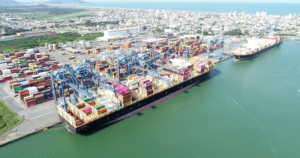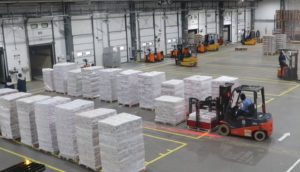São Paulo – Refrigerated logistics center Iceport of the city of Navegantes, Santa Catarina, has a service that specializes in halal products and plans on growing in the industry. Iceport is a subsidiary of container terminal Portonave and provides a structure for exporting and importing frozen goods. It has set up a specific process for halal cargo certified by Cdial Halal.
Iceport Operations manager Bruno Leonardo da Costa Vargas says that halal accounts for 10% of the export operations carried out but that there is room to grow. “Although we are already qualified and have the whole process established, we are constantly improving so that we’re able to receive even more halal goods, which is seen as an expanding market,” Vargas told ANBA by e-mail.
Iceport is know as the cold storage of Portonave. In fact, Iceport’s operations are receiving the exporter’s cargo and managing its arrival at the terminal of Portonavel. The cargo is stored in cold storages, then transported to the vessels to be shipped overseas.

The service involves verifications, storing according to specificities, arranging a mix of products in containers according to the demands of the exporter, issuing documents for the process, and other activities. In importing, the same logistics service is provided but the other way around, with the goods arriving t the port and being distributed across the Brazilian domestic market. Iceport also provides road transport services.
For halal-certified goods, the entire service is provided according to a specific process. Vargas says that there is a management of halal products that arrive from the plants, with delivery, storage and expedition taking place in specific docks and with equipment that follow the rules. The grease use in the equipment is halal, for example. There is a specific storage area for halal.
According to Iceport’s Operations manager, trainings are given to all employees on the halal policies established at the logistic center, internal audits are carried out and good practices are adopted so that they can ensure the demanded flow and processes. The halal process is currently 100% focused on exports.
Iceport plants on expanding into the halal market by growing to serve a higher volume of shipped certified foodstuffs and breaking into other industries like medicines.

Portonave has recently become a member of the Arab Brazilian Chamber of Commerce (ABCC) and together with its subsidiary Iceport supported the Global Halal Brazil business forum in a clear demonstration of its plans to further its participation in Brazilian trade with Arab countries and other halal importing markets. The forum was held earlier in December in a hybrid format and got some 3,000 viewers.
“Brazil has a huge potential of becoming a global halal breadbasket, and Iceport wants to participate in the concept. The rapprochement is key for further understanding the details, so that we can contribute and be able to operate,” Vargas said on the participation in the ABCC and Global Halal Brazil. Iceport plants on becoming a market standard in halal storage.
Vargas points out that the halal market has expanded beyond the Arab and Muslim-majority countries. The certified products are manufactured according to the Islamic rules, but due to the healthiness and sustainability of the processes adopted they have gained supporters across the world, including non-Muslims. “There’re Muslims in Asia, Africa, Europe and elsewhere, and there’re many people that sees in halal food a conscious consumption,” the executive says.
Iceport
Iceport moves approximately 30,000 tonnes a month, with 60 trucks loading and unloading products every day. Vargas say that the largest part of operation, 90%, are exports. The products the company most deals with in exports are meats like poultry and beef.
Imports include chips, onion rings, plant-based and vegan foods. Imports come primarily from European countries like the Netherlands and Belgium. The destinations of exports are diverse, but a large volume is focused on the Far East like Japan as well as South Africa, Chile and Mexico.
Iceport covers a 50,000-square-meter area and has a storage static capacity of 16,000 pallet positions and an anteroom with 13 docks for receiving and sending goods. There is a fully automate cold storage with six stacker cranes. The technologic structure of Iceport includes stocking via Warehouse Management System (WMS), pallet identification via bar codes, process management via data collection with bar codes, electronic cargo check with RFID, and others.
Portonave
Portonave is a private container terminal that ships production from Brazil’s South, Southeast and Center-West region to other countries in Latin America, besides receiving cargo from across the world. Portonave is also known as Port of Navegantes and is a large company with over 1,1000 direct employees.
Earlier this month on December 12, Portonave surpassed a throughput of 1 million TEUs, joining the list of Brazilian terminals that reach this annual mark. Year to date through September, Portonave saw one of the highest throughput increase rates from all Brazilian terminals, stepping up by 37% from a year ago.
Translated by Guilherme Miranda




